CityTouring
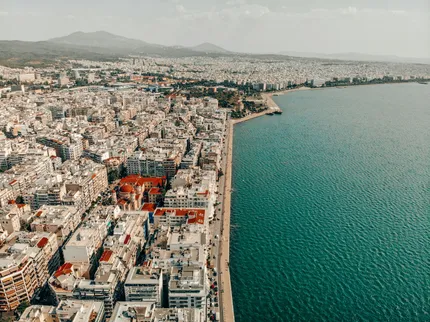
City trip to Thessaloniki
GreeceThessaloniki, Greece's vibrant second city, is a captivating blend of ancient history and modern culture, making it a fascinating destination for a city trip. As you wander its streets, you'll encounter a diverse array of architectural styles, from Roman ruins and Byzantine churches to Ottoman monuments and contemporary structures. The Rotunda, an immense round building steeped in religious history, stands as a testament to the city’s layered past. A walk along the picturesque waterfront reveals stunning views of the Thermaic Gulf, while the White Tower, an iconic symbol, provides panoramic vistas of the city skyline.
Thessaloniki's thriving culinary scene is a feast for the senses, with lively tavernas serving up classic Greek dishes alongside innovative, modern cuisine. The city's bustling markets, such as the Modiano Market, are a treasure trove of local produce and traditional goods, offering an authentic slice of daily life. Don’t miss the vibrant arts scene, from cutting-edge galleries to street art in the hip district of Ladadika, ensuring there’s always something engaging happening in this dynamic city.
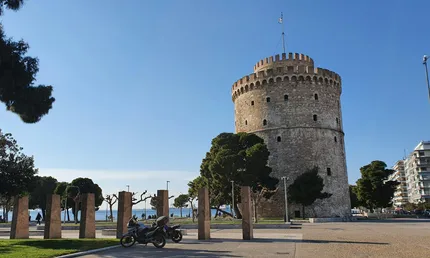
White Tower of Thessaloniki
The White Tower of Thessaloniki is an iconic landmark and a symbol of the city. Originally part of the city's fortifications, this 15th-century structure has served various roles, including a prison and a garrison. Today, it houses an exhibition dedicated to Thessaloniki’s history from antiquity to modern times, offering panoramic views of the city from its rooftop.
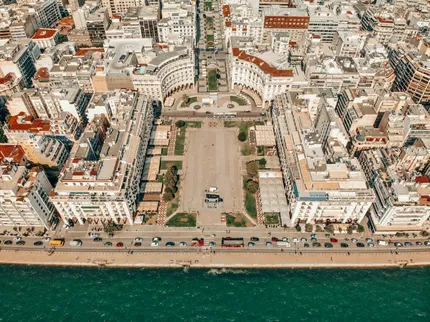
Aristotelous Square
Aristotelous Square is the bustling heart of Thessaloniki, lined with neoclassical buildings and offering stunning views of the Thermaic Gulf. It serves as a central hub for events, social gatherings, and leisurely strolls. This iconic spot is vibrant with cafes, shops, and restaurants, making it an ideal place to experience the city's lively atmosphere and rich cultural tapestry.
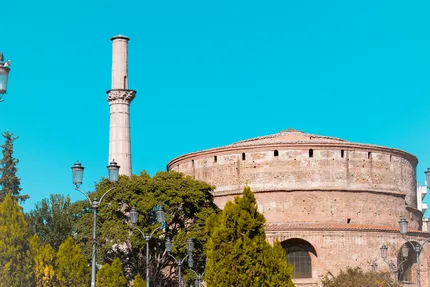
Rotunda of Galerius
Constructed in 306 AD, the Rotunda is one of the oldest religious sites in Thessaloniki, initially built by the Romans for Emperor Galerius. Later converted into a church and a mosque, its stunning mosaics and architecture reflect diverse historical influences, offering a journey through time.
Thessaloniki is an excellent destination for history and culture enthusiasts. Its rich heritage makes it a must-visit for those interested in ancient civilizations and Byzantine history. Couples and small friend groups will find the city’s culinary scene and lively nightlife particularly appealing, especially in areas like Ladadika and the waterfront, where a plethora of bars and restaurants offer both traditional and modern experiences. Foodies will be delighted by the local gastronomy, with ample opportunities to try unique regional dishes. The city also caters to art lovers, with many museums and contemporary art spaces to explore, such as the Macedonian Museum of Contemporary Art.
Solo travelers will appreciate Thessaloniki’s welcoming vibe and easy-to-navigate public transport system, making it an ideal place to explore independently. The city’s walkability and affordable options also make it suitable for budget travelers. While Thessaloniki doesn’t have the world-famous beaches that other Greek destinations boast, it serves as a great launching pad for visits to the nearby Halkidiki peninsula, perfect for those seeking a combination of urban and beach experiences within a short trip.
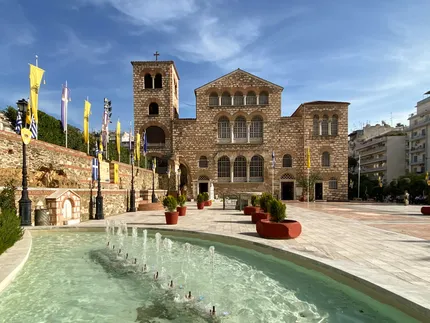
Best time to visit Thessaloniki
The best time to visit Thessaloniki is during the spring months of April to June and in the fall from September to October. During these periods, the climate is mild and pleasant, ideal for exploring the city’s numerous outdoor attractions and historical sites. Summers can get quite hot, often exceeding 30°C, while winters are relatively mild but can be rainy. Visiting during the shoulder seasons also means avoiding the bulk of tourist crowds and enjoying a more relaxed atmosphere, as well as benefiting from relatively lower accommodation prices. Festival-goers might also enjoy a visit during November, when the city hosts its renowned International Film Festival.
More activities and things to see in Thessaloniki:
Thessaloniki Archaeological Museum
The Archaeological Museum houses remarkable artifacts from Macedonia’s ancient history, including sculptures, gold jewelry, and ancient weapons. This museum provides a comprehensive insight into the region's history, from prehistoric times through to the Roman era, making it a must-visit for history enthusiasts.
Ano Poli (Upper Town)
Ano Poli offers a glimpse into traditional Macedonian architecture, with its narrow cobblestone streets and charming old houses. The area is ideal for a leisurely walk, providing panoramic views over the city and a chance to explore historic sites like the Heptapyrgion fortress.
Ladadika District
The Ladadika District is a cultural hotspot, known for its vibrant nightlife, restaurants, and music venues. Formerly a hub for merchants trading olive oil, the area now boasts beautifully restored buildings that house lively tavernas and bars, offering local cuisine and entertainment.
Atatürk Museum
Dedicated to the founder of modern Turkey, Mustafa Kemal Atatürk, this museum is located in the house where he was born. It displays personal items and photographs, providing intriguing insights into the life and legacy of Atatürk and the historical ties between Greece and Turkey.
Byzantine Walls
The Byzantine Walls of Thessaloniki are a series of defensive stone walls that once encircled the city, reflecting its strategic importance through history. Constructed predominantly in the 4th century, these fortifications offer insights into the city's historical significance and military architecture. Visitors can walk along preserved sections, enjoying panoramic views of Thessaloniki and exploring remnants of ancient towers and gates.
Arch of Galerius
The Arch of Galerius, known locally as the Kamara, is a prominent Roman-era monument in Thessaloniki. Erected in 298 AD, it commemorates Emperor Galerius's victory over the Persians. Notable for its detailed reliefs depicting battles and triumphs, the arch offers a glimpse into ancient Rome's artistry and historical events. It stands as a testament to Thessaloniki's rich history.
Church of Agios Dimitrios
The Church of Agios Dimitrios, dedicated to Thessaloniki's patron saint, is a prominent Byzantine structure renowned for its rich history and stunning mosaics. Built on the site where Saint Demetrius was martyred during the Roman era, it offers insight into early Christian architecture. Visitors can explore its impressive crypt and artifacts reflecting its spiritual and cultural significance.
Modiano Market
Modiano Market, located in Thessaloniki, Greece, is a historic covered market established in the late 1920s. Known for its vibrant atmosphere, it offers a diverse range of fresh produce, seafood, spices, and local delicacies. A hub for locals and tourists alike, the market provides an authentic taste of Thessaloniki's culinary culture and a glimpse into daily life in the city.
Waterfront Promenade
The Waterfront Promenade in Thessaloniki is a bustling seafront area offering stunning views of the Aegean Sea. Stretching for several kilometers, it is perfect for a leisurely stroll, cycling, or rollerblading. The promenade is lined with cafes, restaurants, and parks, making it a popular spot for locals and tourists to relax, enjoy the sea breeze, and experience the city's vibrant atmosphere.
Getting around in Thessaloniki
Thessaloniki, Greece's second-largest city, is quite walkable, especially in its vibrant city center, brimming with historical sites and local cafes. The city offers a reliable public transportation system with buses being the primary mode. While taxis are plentiful and affordable, using the mobile application for tracking and booking can enhance convenience. The recently introduced bike lanes make cycling a more feasible option for getting around, especially if you're venturing into areas like the waterfront. Renting a car is an option if planning to explore nearby regions, but within the city, it may not be necessary due to traffic and limited parking. Overall, Thessaloniki's compact urban design makes getting around without a car quite feasible, providing a mix of variety and accessibility.
Getting to Thessaloniki
Thessaloniki is well-connected internationally via Thessaloniki Airport 'Makedonia' (SKG), which hosts numerous flights from major European cities like London, Munich, and Istanbul. The airport is about 15 km from the city center, accessible by bus or taxi. For train travel, the city's main train station provides direct connections to several Balkan countries, which can be ideal for travelers exploring the region overland. International long-distance buses also operate regularly, offering services to cities such as Sofia, Skopje, and Istanbul. Whether arriving by plane, train, or bus, Thessaloniki serves as a convenient gateway to northern Greece and the greater Balkan peninsula, blending ease of access with cultural charm.